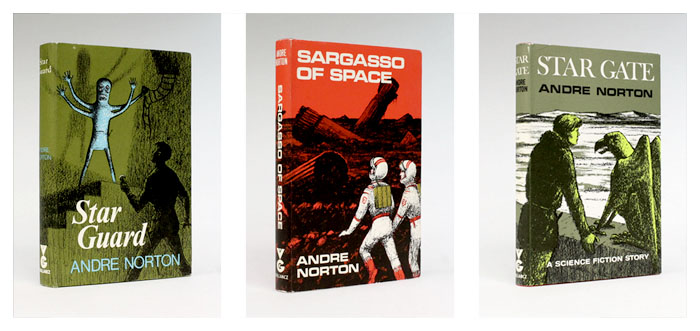Andre Norton’s Early Influence on Science Fiction and Fantasy
Andre Norton (born Alice Mary Norton in Ohio in 1912) was a hugely prolific writer and one of the earliest women to achieve widespread success in the traditionally male dominated genres of science fiction and fantasy.
Norton’s earliest books were historical adventures for young adults (which would have been described as ‘juvenile fiction’ at the time) published in the 30s and 40s. She legally changed her name to the androgynous Andre in the same year that her first book was published under the advice of her publisher, as it was thought that boys would not read a book written by a woman. Speaking in 1982 on this decision, she said that as “a woman in a man’s field” and with so few women were working in genre fiction “we had to”. In a 1985 interview Norton even recalls how she refrained from writing about female characters until Ordeal in Otherwhere in 1964, and that even then her publisher was “most dubious” about the book’s appeal.
In reality, as well as garnering a dedicated general readership, Norton ended up attracting many new female readers to science fiction and fantasy. Many of these such as Mercedes Lackey, Judith Tarr, Sherwood Smith, Martha Wells, and Susan Shwartz then went on to become a part of the next generation of writers in the genre themselves, often citing her as a role model or speaking of a particular, special respect they held for her. Though always modest about her role in bringing more women to the genre, Norton often went out of her way to publicly recommend books by new female writers, frequently collaborated with other women, and created a prize in 1989 called the Gryphon Award, specifically for new books by women writers.
Although Norton’s books, like any product of a specific time, certainly contain stereotypes and concepts that now appear outdated, her casts of characters are much more diverse and varied than their average contemporary’s, and the essential message of her work is that it’s ok to be different, and that equality and respect between all beings is of the greatest importance. Star Guard, for example, is described as ‘subversive’ by Judith Tarr, particularly for the 1950s. Featuring characters with a diverse range of ethnic backgrounds, this post-nuclear-war, interplanetary science fiction is underpinned by a careful exploration of colonialism.
Norton was herself an avid book collector, and it became a passion project of hers to create a research library of rare and fascinating books and artefacts pertaining to science fiction, fantasy, legends, ancient history, gothic, and the occult. She briefly achieved her dream towards the end of her life with “High Hallack Library” in Tennessee, which housed over 10,000 texts and was complete with guest rooms and on-sight facilities so that scholars and writers could completely immerse themselves in their research.
Norton died at age 93 in 2005, and left behind an unmistakeable mark on the world of science fiction and fantasy. She was honoured with the Science Fiction and Fantasy Writers of America‘s Grand Master Award in 1984, and with the World Fantasy Award for lifetime achievement in 1998; and has been commonly referred to as Grande Dame of Science Fiction and Fantasy by publications such as Publisher’s Weekly and Time magazine, biographers, and her fans; but moreover her hundreds of books were read by many generations of readers across a period when the genre was still in its formative state: she had already been a published author for 10 years when J. R. R Tolkien’s The Fellowship of the Ring was published in 1954, and her blend of sword and sorcery fantasy themes with outer space science fiction settings, typified in books like Star Gate, became her trademark long before the same combination became so familiar in the Star Wars franchise.
Find our collection of UK first edition Andre Nortons here.


